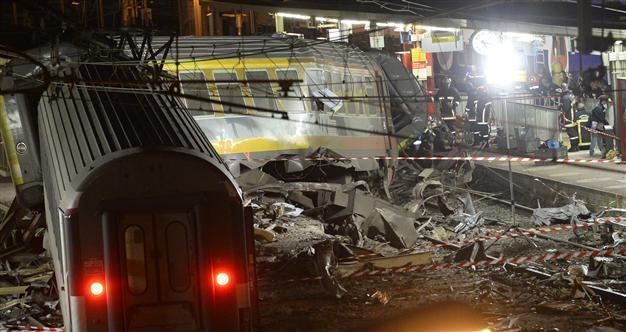At least six dead, many injured in derailment near Paris
BRETIGNY-SUR-ORGE - Agence France-Presse

Rescuers work at night on the site of a train accident on July 12 at the railway station of Bretigny-sur-Orge, near Paris. AFP photo
Rescue workers searched for survivors early July 13, hours after a high-speed train derailed just south of Paris, killing at least six people and injuring 30 more.
The accident, in which the train crashed into a station platform on July 12 afternoon, is France's worst rail disaster in 25 years.
Rescue teams, working under arc-lights, spent the night checking the wreckage of overturned carriages to see if any passengers were still trapped inside and if there were any more bodies to be recovered.
Witnesses said the site of the crash resembled "a war zone". One survivor described walking over a decapitated body to escape an overturned carriage.
The train was a regional service heading from Paris to the west-central city of Limoges. It derailed as it passed through the station at Bretigny-sur-Orge, about 25 kilometres (15 miles) south of Paris.
Such was the violence of the crash that pieces of ballast were found in the town several hundred metres away.
Prime Minister Jean-Marc Ayrault, speaking from the accident site late on July 12, told reporters: "The toll is currently six dead, 30 injured, of whom eight are in a serious condition." Four carriages of the train were derailed in the incident -- and three of those overturned.
Passenger Marc Cheutin, 57, told AFP he had to "step over a decapitated person" after the accident to exit the carriage he had been travelling in.
"Shortly after departure, just as I was getting into my book, we felt a first shock that shook the carriage I was in.... Then there was a second shock and the carriage lifted up, then a third and a fourth and the carriage went over on its side," he said.
A witness who had been waiting for a train at the station, Vianey Kalisa, told AFP: "I saw a lot of wounded people, women and children trapped inside (the carriages).
"I was shaking like a child. People were screaming. One man's face was covered in blood. It was a like a war zone." In the immediate aftermath of the accident, dazed survivors, some in blood-stained clothing, stood near mangled train wagons and the crushed remains of a station platform.
Split in two
Guillaume Pepy, head of the SNCF rail service, told reporters: "We don't yet know the reasons for this derailment." The rail service, judicial authorities and France's BEA safety agency would each be investigating, said Pepy, clearly shaken by the scale of the destruction.
Director of security at SNCF Alain Krakovitch praised the quick reaction of the train driver.
Having felt the train jolting as it entered the station, he sent out the regulation warning signals by radio and by flashing a light, thus stopping all traffic in the area.
His quick thinking had avoided any collision with approaching trains, Krakovitch told reporters.
On July 13 evening President Francois Hollande visited the scene and announced the three separate investigations.
But he added: "We should avoid unnecessary speculation. What happened will eventually be known and the proper conclusions will be drawn." Officials said the derailment happened at 5:14 p.m. minutes after the intercity train left the Paris-Austerlitz station.
"The train arrived at the station at high speed. It split in two for an unknown reason. Part of the train continued to roll while the other was left on its side on the platform," a police source told AFP.
Transport Minister Frederic Cuvillier, who also visited the crash site, said the train had been travelling at 137 kilometres an hour (85 miles per hour) at the time of the crash.
That was below the 150 kph limit for that part of the track.
Some 300 firefighters, 20 paramedic teams and eight helicopters were deployed to treat casualties at the scene and airlift the most seriously injured to nearby hospitals.
In total, 192 people were treated by emergency services, officials said. There were 385 passengers on the train, which means it was not overcrowded.
The accident occurred as many in France were departing for the start of their summer holidays ahead of Bastille Day tomorrow. In Brussels, EU Commission chief Jose Manuel Barroso expressed his condolences in a message to to Hollande.
The derailment was France's worst rail accident since an SNCF commuter train crashed into a stationary train at Paris's Gare de Lyon terminal in 1988, killing 56 people.
